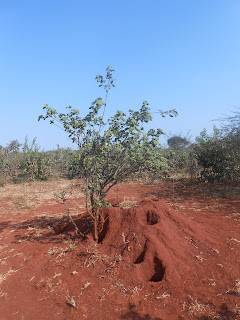Sunday, June 23, 2013
Reflections on Eastern Awareness
Tanzania has over one hundred different tribes that all speak their own tongue. The Masai are seemingly the most dominant, at least in the areas that I have been. They don't believe in the modern day monetary system to measure wealth but rather they believe in a system that is based on the size of the herd and the number of wives. Incest is also part of the culture. When a child turns 9 or 10 they are moved from the 'child bed' to their grandparents bed to be accumulated to the sexual ways of the culture, and therefore, no Masai reaches the age of 12 a virgin. Needless to say, cervical cancer is a major public health concern. Another issue arises in the recent westernization of Tanzania. Parents would rather send their children to the city to work (mostly as guards) than sell one of their heads for money because, like I mentioned above, cattle is worth more than paper money. Families are being split apart and I assume the younger kids being sent to the city to work have major self-identity issues.
Regardless of these facts, the Masai warriors have a mystic aura, an ancient power, a calm so unusual and intimidating to a westerner that when the first time I saw one, I was mesmerized, I stopped in mid stride, captured in a vivid trance. This has only ever happened one other time to me and that was when I was hiking through the jungle of Laos and Buddhist Monks were religiously bathing in the waterfall.
The first Masai warrior I met was in Msasani, he had been sent to the city to work as a guard/watchmen. They make remarkable watchmen because from the age of 5 they have a herd of their own in which they walk along the arid steppe to graze. He greeted me with a big smile, the white of his teeth starkly contrasting the rich blackness of his skin. Wearing his traditional red draped blanket, he told me that westerners were to conservative with their clothing choices. His flip-flops were made of leather. He wore finely beaded bone bracelets around his ankles, wrists, and arms, and a bone necklace. His ears were gauged and bone rings the size of lemons inhabited the area. His hair was braided into what looked like a spartan helmet. He carried only a finely carved wooded stick.
The Masai women seem even more powerful. They have all of the aforementioned characteristics. Their hair doesn't grow but but a few centimeters. However, they are easily distinguishable from the males because of their womanly beauty.
Is it my naivety to the cultures I visit that causes me to have these experiences? My lack of research about the indigenous culture? My lack of knowledge of the westernization of the east?
Since I have seen many Masai warriors, Masai women, and other tribes in both rural and urban settings. Both are fascinating for different reasons: In urban settings for the reasons mentioned above and the rural because I get to witness practices that have sustained the test of time for centuries upon centuries. It's amazing the control and connection they have with their cattle, it's almost like they are part of the herd, the leader. The herds consist of cattle, goats, and donkeys. On our recent road trip to the south of the country, the car broke down in the middle of the semi-desert between Dodoma and Mwanza. The houses were made out of red mud, acacia and baobab trees spotted the landscape, and many nomadic herders crossed our path while we waited eight hours for parts and a mechanic to arrive from the nearest village (100km). I followed one of the herds for about an hour, at first observing from a distance, the warrior obviously noticing, and then with the warrior, trying to communicate. Although the national language is Kiswahili, there are over 120 different languages in Tanzania, so the small amount of Kiswahili I have picked up was useless. All I wanted to ask was if he named his animals! Luckily the mechanics able to fix the drive shaft and jump the battery with without using jumper cables. (see picture above, they ended up using 3 wrenches to do the job!!!)
For the past couple of weeks I have been teaching a course at the school of public health in Health GIS. The students are nurses, dentists, MDs, and pharmacists coming back for their MPH and because it is a Catholic University, one of the students is a Nun. She is intelligent, thoughtful, and also has a calm similar to the Monks and Masai. What do all of these people have in common?
I think the Masai,
the Monks, the Nuns, all spend inordinate amounts of time meditating (and I use that word very broadly). The Monks literally meditate, the Masai spend days without anyone except their cattle in a peaceful watch, the Nuns spend 4 hours in the morning and 4 hours in the evening in repetitive prayer. These practices create a self-awareness, an insight, a mindfulness much more powerful than I have witnessed in a lot of western culture.
Subscribe to:
Post Comments (Atom)




No comments:
Post a Comment